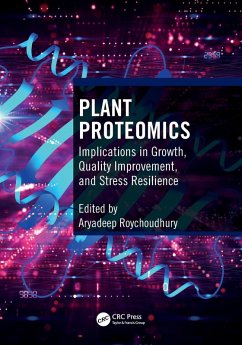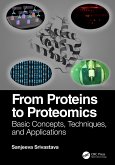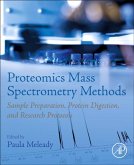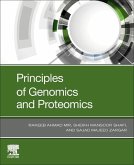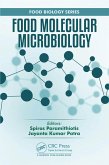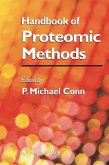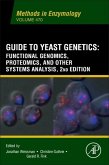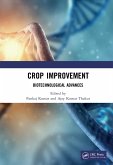Plant Proteomics
Implications in Growth, Quality Improvement, and Stress Resilience
Herausgeber: Roychoudhury, Aryadeep
Plant Proteomics
Implications in Growth, Quality Improvement, and Stress Resilience
Herausgeber: Roychoudhury, Aryadeep
- Broschiertes Buch
- Merkliste
- Auf die Merkliste
- Bewerten Bewerten
- Teilen
- Produkt teilen
- Produkterinnerung
- Produkterinnerung
Plant Proteomics: Implications in Growth, Quality Improvement, and Stress Resilience introduces readers to techniques and methodologies of proteomics and explains different physiological phenomena in plants and their responses to various environmental cues and defense mechanisms against pathogens.
Andere Kunden interessierten sich auch für
![From Proteins to Proteomics From Proteins to Proteomics]() Sanjeeva SrivastavaFrom Proteins to Proteomics60,99 €
Sanjeeva SrivastavaFrom Proteins to Proteomics60,99 €![Proteomics Mass Spectrometry Methods Proteomics Mass Spectrometry Methods]() Proteomics Mass Spectrometry Methods136,99 €
Proteomics Mass Spectrometry Methods136,99 €![Principles of Genomics and Proteomics Principles of Genomics and Proteomics]() Rakeeb Ahmad Mir (School of Bioscience Department of BiotechnologyPrinciples of Genomics and Proteomics120,99 €
Rakeeb Ahmad Mir (School of Bioscience Department of BiotechnologyPrinciples of Genomics and Proteomics120,99 €![Food Molecular Microbiology Food Molecular Microbiology]() Food Molecular Microbiology55,99 €
Food Molecular Microbiology55,99 €![Handbook of Proteomic Methods Handbook of Proteomic Methods]() P. Michael Conn (ed.)Handbook of Proteomic Methods166,99 €
P. Michael Conn (ed.)Handbook of Proteomic Methods166,99 €![Guide to Yeast Genetics: Functional Genomics, Proteomics and Other Systems Analysis Guide to Yeast Genetics: Functional Genomics, Proteomics and Other Systems Analysis]() Guide to Yeast Genetics: Functional Genomics, Proteomics and Other Systems Analysis114,99 €
Guide to Yeast Genetics: Functional Genomics, Proteomics and Other Systems Analysis114,99 €![Crop Improvement Crop Improvement]() Crop Improvement80,99 €
Crop Improvement80,99 €-
-
-
Plant Proteomics: Implications in Growth, Quality Improvement, and Stress Resilience introduces readers to techniques and methodologies of proteomics and explains different physiological phenomena in plants and their responses to various environmental cues and defense mechanisms against pathogens.
Hinweis: Dieser Artikel kann nur an eine deutsche Lieferadresse ausgeliefert werden.
Hinweis: Dieser Artikel kann nur an eine deutsche Lieferadresse ausgeliefert werden.
Produktdetails
- Produktdetails
- Verlag: Taylor & Francis Ltd
- Seitenzahl: 308
- Erscheinungstermin: 3. Juni 2024
- Englisch
- Abmessung: 254mm x 178mm x 17mm
- Gewicht: 578g
- ISBN-13: 9781032395920
- ISBN-10: 1032395923
- Artikelnr.: 69792351
- Herstellerkennzeichnung
- Libri GmbH
- Europaallee 1
- 36244 Bad Hersfeld
- gpsr@libri.de
- Verlag: Taylor & Francis Ltd
- Seitenzahl: 308
- Erscheinungstermin: 3. Juni 2024
- Englisch
- Abmessung: 254mm x 178mm x 17mm
- Gewicht: 578g
- ISBN-13: 9781032395920
- ISBN-10: 1032395923
- Artikelnr.: 69792351
- Herstellerkennzeichnung
- Libri GmbH
- Europaallee 1
- 36244 Bad Hersfeld
- gpsr@libri.de
Prof. Aryadeep Roychoudhury is currently working as Professor in the Discipline of Life Sciences, Indira Gandhi National Open University, New Delhi, India. Earlier, he served as Assistant Professor at the Post Graduate Department of Biotechnology, St. Xavier's College (Autonomous), Kolkata, West Bengal, India. He earned his B.Sc. (Hons.) in Botany from Presidency College, Kolkata, and M.Sc. in Biophysics and Molecular Biology, University of Calcutta, West Bengal, India. He earned his Ph.D. from Jadavpur University, Kolkata in the area of stress biology in plants. Following his Ph.D. work, he joined the University of Calcutta as Research Associate (post-doctorate), pursuing translational research on transgenic rice. He is presently involved in active research in the field of abiotic stress responses in plants with perspectives to the physiology, molecular biology and cell signaling under diverse stress conditions. He has 23 years of research experience in the concerned discipline. Prof. Roychoudhury has handled several government-funded projects as principal investigator and supervised five Ph.D. students as principal investigator. He has published over 250 articles in peer-reviewed journals and chapters in books of international and national repute. He has edited many books with Wiley, Elsevier, Springer, Taylor & Francis Group, and Nova, and has also handled Special Issues as Guest Editor for several renowned international journals. He is a regular reviewer of articles in high-impact, international journals, Life Member of different scientific associations and societies, and the recipient of the Young Scientist Award 2019, conferred upon him by International Foundation for Environment and Ecology, at University of Allahabad, Prayagraj, Uttar Pradesh. His name is included in the Stanford University's List of World's Top 2% Influential Scientists.
Chapter 1: Plant proteome analyses in response to seed development. Chapter
2: Advances in plant proteomics toward improvement of crop productivity and
stress resistance. Chapter 3: Proteomics research in understanding
photosynthesis-related proteins in plants. Chapter 4: Proteomic analyses to
understand differentially expressed proteins during floral development.
Chapter 5: Proteomic responses to salinity and drought stress in plants.
Chapter 6: Proteomics studies to understand heavy metal stress response in
plants. Chapter 7: Proteomic Responses of Plants to Nutritional Stress.
Chapter 8: Effect of ionizing radiation on physiological activities of crop
plants exposed to various abiotic stresses and their proteome analysis.
Chapter 9: Phosphoproteomic study of plants under different abiotic stress.
Chapter 10: Advancement in proteomics research in response to biotic stress
in plants. Chapter 11: Proteomic-driven approaches for unravelling
plant-microbe interactions. Chapter 12: Deciphering Plant-microbe Crosstalk
Through Protemics Tools. Chapter 13: Dissecting Plant Virus Interactions
Through Proteomics. Chapter 14: Plant proteomics research for enhancing
resistance against insect pests. Chapter 15: Proteomics Approaches in
Medicinal Plant Research and Pharmacological Studies. Chapter 16:
Proteomics-based strategies to develop food crops. Chapter 17: with
enhanced nutritional quality. Chapter 18: Understanding post translational
protein modification through proteomics tools.
2: Advances in plant proteomics toward improvement of crop productivity and
stress resistance. Chapter 3: Proteomics research in understanding
photosynthesis-related proteins in plants. Chapter 4: Proteomic analyses to
understand differentially expressed proteins during floral development.
Chapter 5: Proteomic responses to salinity and drought stress in plants.
Chapter 6: Proteomics studies to understand heavy metal stress response in
plants. Chapter 7: Proteomic Responses of Plants to Nutritional Stress.
Chapter 8: Effect of ionizing radiation on physiological activities of crop
plants exposed to various abiotic stresses and their proteome analysis.
Chapter 9: Phosphoproteomic study of plants under different abiotic stress.
Chapter 10: Advancement in proteomics research in response to biotic stress
in plants. Chapter 11: Proteomic-driven approaches for unravelling
plant-microbe interactions. Chapter 12: Deciphering Plant-microbe Crosstalk
Through Protemics Tools. Chapter 13: Dissecting Plant Virus Interactions
Through Proteomics. Chapter 14: Plant proteomics research for enhancing
resistance against insect pests. Chapter 15: Proteomics Approaches in
Medicinal Plant Research and Pharmacological Studies. Chapter 16:
Proteomics-based strategies to develop food crops. Chapter 17: with
enhanced nutritional quality. Chapter 18: Understanding post translational
protein modification through proteomics tools.
Chapter 1: Plant proteome analyses in response to seed development. Chapter
2: Advances in plant proteomics toward improvement of crop productivity and
stress resistance. Chapter 3: Proteomics research in understanding
photosynthesis-related proteins in plants. Chapter 4: Proteomic analyses to
understand differentially expressed proteins during floral development.
Chapter 5: Proteomic responses to salinity and drought stress in plants.
Chapter 6: Proteomics studies to understand heavy metal stress response in
plants. Chapter 7: Proteomic Responses of Plants to Nutritional Stress.
Chapter 8: Effect of ionizing radiation on physiological activities of crop
plants exposed to various abiotic stresses and their proteome analysis.
Chapter 9: Phosphoproteomic study of plants under different abiotic stress.
Chapter 10: Advancement in proteomics research in response to biotic stress
in plants. Chapter 11: Proteomic-driven approaches for unravelling
plant-microbe interactions. Chapter 12: Deciphering Plant-microbe Crosstalk
Through Protemics Tools. Chapter 13: Dissecting Plant Virus Interactions
Through Proteomics. Chapter 14: Plant proteomics research for enhancing
resistance against insect pests. Chapter 15: Proteomics Approaches in
Medicinal Plant Research and Pharmacological Studies. Chapter 16:
Proteomics-based strategies to develop food crops. Chapter 17: with
enhanced nutritional quality. Chapter 18: Understanding post translational
protein modification through proteomics tools.
2: Advances in plant proteomics toward improvement of crop productivity and
stress resistance. Chapter 3: Proteomics research in understanding
photosynthesis-related proteins in plants. Chapter 4: Proteomic analyses to
understand differentially expressed proteins during floral development.
Chapter 5: Proteomic responses to salinity and drought stress in plants.
Chapter 6: Proteomics studies to understand heavy metal stress response in
plants. Chapter 7: Proteomic Responses of Plants to Nutritional Stress.
Chapter 8: Effect of ionizing radiation on physiological activities of crop
plants exposed to various abiotic stresses and their proteome analysis.
Chapter 9: Phosphoproteomic study of plants under different abiotic stress.
Chapter 10: Advancement in proteomics research in response to biotic stress
in plants. Chapter 11: Proteomic-driven approaches for unravelling
plant-microbe interactions. Chapter 12: Deciphering Plant-microbe Crosstalk
Through Protemics Tools. Chapter 13: Dissecting Plant Virus Interactions
Through Proteomics. Chapter 14: Plant proteomics research for enhancing
resistance against insect pests. Chapter 15: Proteomics Approaches in
Medicinal Plant Research and Pharmacological Studies. Chapter 16:
Proteomics-based strategies to develop food crops. Chapter 17: with
enhanced nutritional quality. Chapter 18: Understanding post translational
protein modification through proteomics tools.

